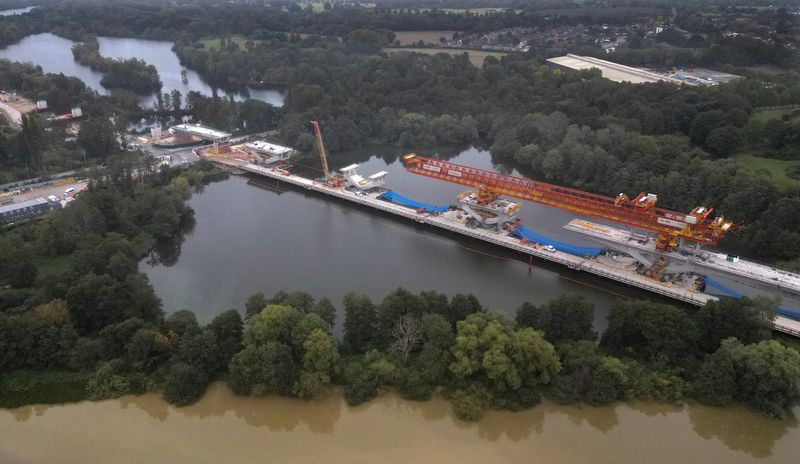By William Schomberg
LONDON (Reuters) - The downsizing of Britain's high-speed railway has turned a sharp spotlight on the long delays and high costs that typically beset major infrastructure investment projects in the country, and act as a drag on its slow-moving economy.
High Speed 2 (HS2) was hailed by a string of past prime ministers as a fix for Britain's geographic income gap but will now no longer run to Manchester in northern England and be built only from London to Birmingham, about half its original length.
Prime Minister Rishi Sunak promised on Wednesday to invest the savings of 36 billion pounds in other transport projects, saying they represented a better way to right the earnings imbalance between London and Britain's regions.
"There is nothing ambitious about simply pouring more and more money into the wrong project," Sunak told the annual conference of his Conservative Party. "There is nothing long-term about ignoring your real infrastructure needs."
HS2 aimed to help Britain catch up with other European nations that operate well-connected high-speed rail networks. Britain's only existing high-speed link runs from London to the rail tunnel to mainland Europe.
Critics of HS2 have long said it was too expensive - cost estimates soared from 37.5 billion pounds in 2013 to around 100 billion pounds - and they questioned the economic benefits it would bring.
HS2's supporters contest that without the line running all the way to Manchester, the government will fail to address the growing congestion on the existing rail network and much less the challenge of "levelling up" the country.
"The decision today sends a hugely disappointing message about our commitment to completing major infrastructure projects in the UK," Stephen Phipson, chief executive of Make UK, a manufacturing industry group, said.
"The signal that this sends to potential investors could not be clearer."
Representatives of HS2 contractors, at the Conservative Party conference, expressed anger at the decision, saying they had already spent heavily to increase capacity.
RUNWAYS, METROS AND RAILWAYS
Britain has long struggled to deliver big infrastructure projects, adding to the challenges facing an economy that grown sluggishly over the 15 years since the global financial crisis.
HS2 was originally proposed in 2009 but it might be 2033 before the first service between London and Birmingham runs.
A planned third runway at London's Heathrow Airport was bogged down for years in legal and political battles before getting the green light by the Supreme Court in 2020. The COVID pandemic raised fresh questions about whether expansion was still needed, however.
Crossrail, a major new metro line in London and surrounding counties, opened last year but was three-and-a-half years late and 4 billion pounds, or almost 30%, over budget.
It's not just in Britain where big public investment projects take too long and cost too much: Berlin's new airport took 14 years to complete and had six delayed openings before it finally welcomed passengers in 2020.
But Britain Remade, a campaign group pushing for infrastructure reforms to speed up Britain's economy, says the soaring costs racked up by HS2 are replicated right across the range of public sector projects.
Tram systems in Britain are two and a half times more expensive than those in France on a per mile basis, it says.
The strain of those higher costs - often inflated by protracted court battles in the planning process - are compounded by low levels of government investment since the global financial crisis.
HIGHER COSTS, LOWER SPENDING
Public sector net investment (PSNI) sank to about 2% of economic output in recent years from the levels of 6-7% that were typical in the 1960s and 1970s, although some of that reflects privatisations that reduced the role of the state, Ben Zaranko, an economist at the Institute for Fiscal Studies think tank, said.
Although PSNI has been ramped up since the COVID-19 pandemic and is due to reach almost 3% in the current financial year, it is set to fall again to almost 2% in four years' time as the government plans to tighten its belt.
By way of comparison, government investment averages 3.3% across the countries which are members of the Organisation for Economic Co-operation and Development.
Zaranko said the plans of the opposition Labour Party - riding high in opinion polls before an election expected next year - to invest an extra 20 billion pounds a year in net zero projects - would not provide an increase in areas such as transport.
Britain is also struggling to find money for housing, schools, its water system and the power industry.
A clear picture was emerging of a low-investment country with a productivity growth rate that was lagging behind neighbours such as France, Zaranko said.
Long-running arguments about big projects, such as HS2, were also making it harder for companies to plan for the long term and were hindering economic growth.
"There is clearly something peculiar about the UK's process of decision-making," he said.
